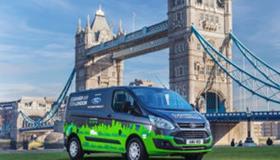The Committee on Climate Change is calling for a renewed drive to cut HGV emissions after noting that transport emissions are continuing to rise despite improvements in technology.
The call is made in the committee’s report to parliament, Reducing emissions and preparing for climate change, which was published this week.
It criticises the government for dragging its feet on delivering action strategies laid out in the Climate Change Act 2008.
It also warns that the UK is in danger of missing its target to reduce greenhouse gas emissions by 57% by 2030, compared to the level in 1990.
To date the UK has cut emissions by 42% since 1990.
It raises concerns that some sectors, including transport, could do more to cut emissions.
It states: “Most of the UK success in reducing emissions to date comes from sharp reductions in the power and waste sectors. Despite improvements in technology, emissions in the transport and building sectors are rising.”
The report sets out where the government must take action to meet its emissions target.
Its recommendations include a number of transport policies including new measures to support emissions reduction from HGVs, and new vehicle efficiency standards requiring electric options for smaller trucks.
The committee also wants to see new policies to create more efficient logistics, increased uptake of eco-driving measures, and a shift to lower-carbon modes such as rail freight.
The report praises those local authorities where measures to reduce urban emissions have been introduced but warns that a supportive national framework, which includes strategic and regulatory decisions and funding, is vital if progress is to be made nationally.
It also warns that carbon-cutting opportunities arising from leaving the EU, such as reform of the Common Agricultural Policy and the ability to develop jobs based on a low carbon economy “will require clear strategic thinking, but time and resources risk being in short supply given other pressing demands ahead of the UK formally leaving the EU”.

The FTA said the report showed there is “still much work to do to get significant carbon reduction from freight”.
The association called on the government to introduce measures such as longer or heavier lorries, rail and water freight infrastructure investment and the roll-out of alternative road fuel infrastructure, with tax benefits to encourage faster take up.
FTA national policy head Christopher Snelling said: “In contrast to air quality where we have achieved an 80% reduction in local air pollutants from the latest diesel HGVs, progress in reducing greenhouse gas emissions is clearly slower and in many ways a harder problem to solve.”













